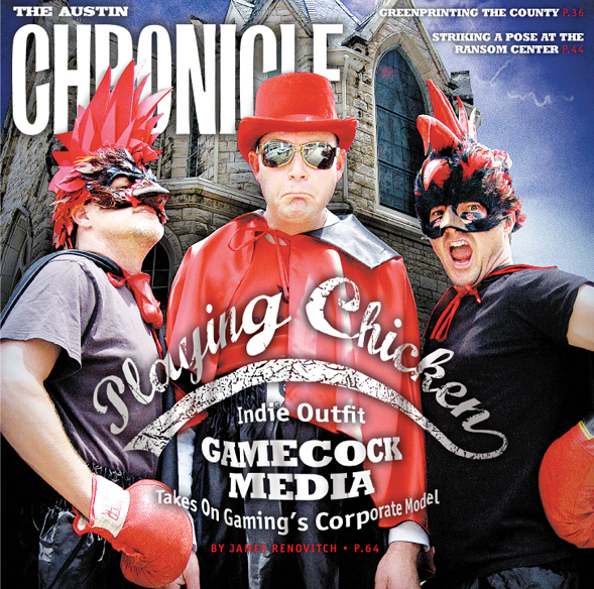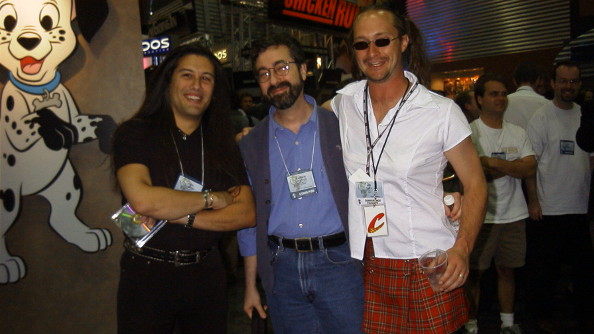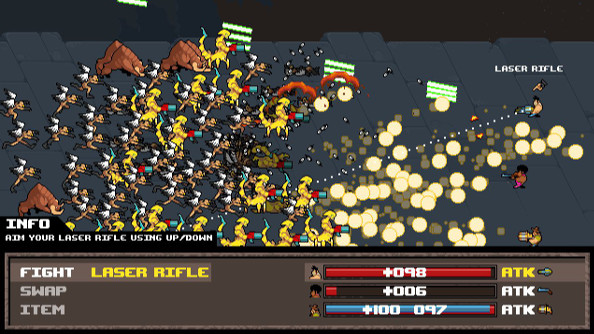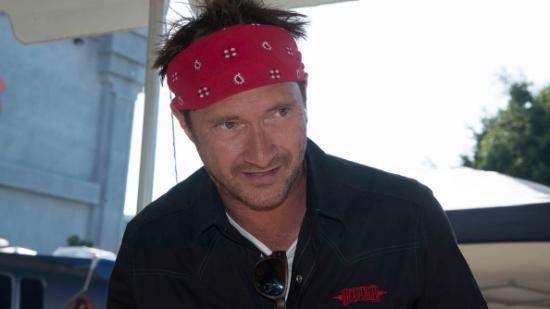Devolver Digital just celebrated its fifth anniversary. In its short life, it’s arguably become the most famous indie game publishing label around, with smash hits like Dennaton’s Hotline Miami and Croteam’s Serious Sam: BFE to their credit, along with well-received darlings like Luftrausers, from Vlambeer.
But while Devolver is a young company, it’s actually the latest chapter in a long saga for longtime business partners and friends Mike Wilson, Harry Miller, and Rick Stults. It’s the “third time is the charm” company for the two men, who have been struggling to create a creators-first publisher since the late 1990s. With Devolver, they finally seem to have hit on something small, successful, and sustainable.
But first they had to fail. A lot. And in public.
Note: Some quotes here are from an interview conducted at GDC this spring, while others are from this most recent E3. For clarity, they are presented as part of one conversation.
You could be forgiven for not taking Wilson or Devolver seriously. After all, they don’t look serious. Their public CFO is a fictional Twitter character named Fork Parker. Their press events are more like a house party. At GDC they were in a basement art gallery, showing off the best fan art created for their games while knocking back beers and snacks.
At E3, they threw a barbecue in the Hooters parking lot across the street from the LA Convention Center, and datelined all their press releases from “the Hooters parking lot”. They put on demo sessions inside Airstream trailers, while anyone who stopped by was quickly offered free beer and good barbecue.
Wilson himself never looks like an executive, not even a trendy tech executive. Shorts and a ratty T-shirt are his uniform. He comes across like a grown-up, careworn version of Matthew McConaughey’s Wooderson from Dazed and Confused. Laugh lines crease his face nears his eyes and mouth, and with a beer in his hand in the LA sunshine, he looks like a clear and present danger to start singing “Margaritaville” at any moment.
Wilson’s career has been an odd one. He’s a successful businessman with a number of hit games to his credit… and yet most of what he’s been known for prior to Devolver has been spectacular flameouts and controversy.
He ventures another controversial statement at E3. “The indie bubble burst yesterday,” he says.
Then he points at a large white balloon printed with the Devolver logo. It is wearing a duct-tape Band-Aid.
“That’s our indie bubble. The only indie bubble there is. We put that up there for Peter Molyneux.”
Business is good and Wilson is confident, but he’s not naive. He’s had more than his share of bubbles burst underneath him. But after five good years, maybe the best run in his career, this time really does seem different.
The Gathering Era
WIlson and his longtime business partners, Harry Miller and Rick Stults, have long sought to create a United Artists-like publishing company that would put creators first. Their first label was GoD (Gathering of Developers) Games, publishing “supergroup” that promised developers an alternative model of doing business compared to the more exploitative and controlling models employed by EA, Sierra, and Microprose.
“That was our first crusade in publishing, but it was really taking the idea …[from] 3D Realms, and that whole Dallas Mafia, to fight that good fight. They were using their power as the rockstars of that era to say ‘No, nobody gives a fuck who the publisher is, our name and logo’s going to go on the front.’”
For a startup, GoD Games had a surprisingly successful track record. While there were relative duds like the unloved flight-sim, Fly!, they also published Jazz Jackrabbit 2, Railroad Tycoon 2, and Age of Wonders.
But there was just one problem: one of GoD Games’ original backers was Take-Two Interactive. Just before they could release Remedy’s Max Payne, Take-Two decided to roll their investment into a full acquisition.
Wilson gives a wan smile at this point in the story. “Yeah, they basically started this whole acquisition, and I almost killed myself.”

It’s not clear if he’s joking or not. He’s not having fun with this part of the conversation, and the buoyant, laid-back character of a few minutes earlier is replaced by someone who looks older and a lot more tired.
“Take-Two ended up buying pretty much every studio that had a hit because it was cheaper for them to buy them than to pay… because back then we had really high royalty rates, it was all merit based; If you made a hit, you got rich – if you didn’t make a hit, who gives a shit what your royalty rate is because you don’t get anything! And they were all high-end PC games so everything slipped, as they will, and we just ran out of time before Max Payne came out.”
He shrugs. “Yeah it was like… the worst. I ended up making a lot of money, because we got all this stock.” Suddenly the smile is back. “Which we assumed would be worthless, because it was fucking Take-Two! Then Grand Theft Auto happened while we were waiting out our [contractual] year, so it all worked out okay for everybody. But we all sold our stock the first day we could and left.”
Wilson’s not bitter toward Take-Two, exactly. It’s just that circumstances that have always dogged him and the developers he’s tried to represent.
“I can’t fault them. They gave us a chance. Ryan Brant started Take-Two way back, and he gave us five million dollars that he didn’t have. But that came with hooks. …It was painful. It was a crusade to try to change the industry from the artist’s side. So it really felt like shit. I’m sure the United Artists guys and Image Comics guys felt the same way.”
United Artists and Image Comics are two analogies that Wilson returns to a lot. They represent both the hope and the fear that have been with him throughout his career. Like Devolver, or like GoD Games, they were started with the goal of putting creators ahead of corporations. But the former became exactly the thing it rebelled against, and Image nearly fell apart into acrimony and jealousy. And those are success stories.
Wilson still seems to consider GoD Games a failure, even though he’s also quick to remind you that most of the games they launched were very successful. That wasn’t why they started the company, and so GoD Games represented the last chance Wilson had to help large PC development studios independent and in control of their own works.
That historical moment had irrevocably passed when Wilson and Milller tried again in 2007, this time with Gamecock Media.
Mistakes were made.
Grabbing the mike
“Gamecock was before this indie wave,” Wilson explains. “Back when everyone was like, ‘PC is dead.’ Everything had to be multiplatform, so that meant we had to raise more money. These were five, ten million dollar games. [For comparison] Hotline Miami was a half million or less.”
Wilson was just coming off another stint with Take-Two, overseeing their PC games portfolio, when his old GoD partner Harry Miller pitched him on trying another publishing startup.
“Harry came back and it was kind of like a ‘Let’s put the band back together again’ situation. But now games were much more expensive and I was still pissed off — That’s actually why the company was called GameCock: it was like, ‘the only way we’re doing this is if we make absolutely sure we don’t get serious about this whole business.’”
But Gamecock was cursed from the start. It served too many masters, and the money-people behind the company didn’t share Wilson and Miller’s vision.
“We raised so much money that we had no control whatsoever from the beginning, and those investors had a very specific idea: very fast portfolio,” Wilson explains. “Cause they wanted to sell the thing. They wanted to get their money out ASAP.”
That wasn’t going to be easy because unlike GoD Games, Gamecock didn’t have anything in the pipeline. Mid-tier, multiplatform releases are never fast or easy, and so Gamecock was looking at a long dry spell before its investors even stood a chance of seeing their money come back via sales. So with no tasty steak to dangle in front of potential buyers, the investors told Wilson, Stults, and Miller to sell the sizzle.

“Literally from day one, after we got the money in, we realized we had zero control. We were middle managers with the title of CEO and President. And the investors wanted a lot of press, they wanted splashy.”
Wilson knows from splashy. Before founding GoD Games, he helped found Ion Storm and was the architect behind the infamous “suck it down” ad for Daikatana. It wasn’t the first time his sense of publicity and showmanship outran his judgment and, as he proved at Gamecock, it wouldn’t be the last.
Gamecock, in retrospect, sounds almost like a Bizarro Devolver. It was expensive and unfocused where Devolver is lean and committed to indies. It was always deep in debt to its backers, where Devolver was independent almost immediately. And where Devolver is fun and playful, Gamecock often came across like a bunch of fratty assholes.
Most of what Gamecock is remembered for is its disastrous appearance at the 2007 SpikeTV Videogame Awards. At the end of the night, just as Ken Levine was accepting the award for Game of the Year, a bunch of interns wearing rooster outfits rushed the stage, grabbed the microphone, and shilled for Gamecock. Levine never got to deliver his acceptance speech.
Wilson had green-lit the plan, but he’d never imagined that it would go forward at the most offensive possible time.
“Any other moment during that fucking horrific show would have been perfect,” Wilson laments. “Whatever stupid ‘brought to you by Mountain Dew’ moment — And he didn’t even get to speak! He didn’t get to speak, and had I been there of course I would have grabbed those guys… by the scruff of the neck. But I was not there.”
Wilson and Gamecock ended up in the spotlight one more time, when he got into a public feud with his former Ion Storm partner John Romero. Romero took a shot at Gamecock and at Wilson, blaming Wilson for a number of Ion Storm’s problems and claiming that while at GoD Games, Wilson “pretty much just partied all the time…”
Wilson’s response was instantly legendary. He wrote Romero a letter via Kotaku, and went straight for the jugular: “I really never thought I would relive the joy that was Ion Storm, circa 1997, or that the memories of those times still troubled you so 11 years later. Then again, I would guess you live in the memories of your twenties as much as you can, given the reality of your thirties….”
And that’s when the letter gets really mean.

Wilson cringes a bit at when I bring up the story. “I regretted it immediately,” he explains. “I was genuinely spurred on to respond by a lot of old friends that had worked with both of us, but I was very shit-housed on vodka at 4 in the morning at Russia when I did that. …It’s funny how you work in the business for twenty years and it’s these moments…” Wilson trails off.
Those two moments, the SpikeTV debacle and Wilson’s scorched-earth takedown of John Romero, are really all that Gamecock is remembered for. Whatever plans Wilson and Gamecock’s backers had, they were scuppered by the financial crash of 2008. The company went down with it and, sold in a fire-sale by its backers, and once again Wilson was left wondering how to pick up the pieces.
Publishing Devolved
But for all their mistakes along the way, Wilson, Stults, and Miller still had some good karma out there in the game industry. As they looked into starting another publisher, they ended up talking to Croteam — the studio behind the Serious Sam series. Croteam had created Serious Sam while working with GoD Games, and under the GoD Games contract they’d signed, they still owned their own franchise. Now they wanted to work with their original publishers again.
And just like that, in June of 2009, Devolver was born.
“Serious Sam was all we had. We started Devolver [to be] the opposite of GameCock where we had one game, one franchise,” Wilson says. “We started very quietly, no Devolver anything, and we have no noise. [But] there was a lull, waiting for Serious Sam 3 and we had already started marketing and PR and Croteam’s like ‘Well, we might need like nine more months.’”
That awkward delay in Devolver’s plans is what ultimately gave the company its identity and its mission.
“So we’re not just going to leak screenshots for nine months of Serious Sam 3, right? We had the idea of tapping some of these indies that were now on the scene.”
From the outside it all looked like it was part of a plan, but Devolver were actually improvising very cleverly. They would fill the time until Serious Sam was ready with… other Serious Sam games. Except these would all be from indie developers, each giving their own take on the franchise.
“We approached Croteam with the idea: ‘What if we loaned the IP?’ – it’s their IP, not Devolver’s – ‘What if we loaned the IP to these guys, and see what they can do?’ and I really credit Croteam for saying yes. It was their decision, and their IP that could have been damaged by some crappy games, but they were impressed enough with these up-and-coming two person teams that they said yes.”
The game that stands out in Wilson’s mind is Vlambeer’s Serious Sam: The Random Encounter, a turn-based version of Serious Sam.

“They seriously pitched that to us because they thought there was absolutely no way we would say yes, and we did! We were like, “Okay!’ and then they were fucked, because they had pitched it!” Wilson laughs. “And that’s how we got to know Vlambeer, because they did that game that they didn’t want to do. That they thought we would never say yes to.”
As Devolver started releasing these indie Serious Sams, their plans started to change. “We really got kind of inspired and addicted to working with these tiny teams that are making amazing things in not a lot of time with not a lot of money. It’s just so much more fun than staring at the same game for three or four years waiting for it to come out, you know?”
It snowballed from there. If there is a theme to Wilson’s career, besides trying to keep things casual and fun (and occasionally running headfirst into brick walls), it is that he and his companies have a way of engendering loyalty and trust that often leads to the next big opportunity.
For instance, Wilson suspects the decision to publish The Random Encounter earned Devolver some respect from Vlambeer. It was a crazy decision for Devolver, calling their bluff like that, but it was a brave one. So later, when the gang at Vlambeer befriended the developers at Dennaton Games, they were quick to introduce them to Devolver. That let Devolver publish Hotline Miami, which massively raised the profile of both Devolver and Dennaton.
Hotline was a massive success for Devolver and an even bigger one for Dennaton, who have gone on to point other indies Devolver’s way. It’s also allowed the company to expand by 20% — by going from five employees to six. They still don’t have their own office, and that seems to be the way Wilson prefer it.
The thing to remember, Wilson stresses during our conversation, is that none of the people at their E3 event have to be there. There are no strings tying developers to Devolver. Vlambeer were free to make Ridiculous Fishing without Devolver, and they were just as free to partner up for Luftrausers. Dennaton don’t really need Devolver anymore at all. Hotline Miami 2 will almost sell itself, and yet they’re still with the publisher.
“The traditional way of thinking, it’s like; ‘Oh, if you don’t own the developers or own the IP then they’ll just leave you for a better deal.’ And that’s… yeah! If you’re trying to trap them into working with you, then sure, that’s what you think.
“But if it’s an actual relationship, where they’re with you because you’re cool to them and you do stuff that they don’t want to do — I mean that’s the only reason that any of these guys are working with us.”
The right time, the right place
Devolver is that rarest of beasts in the mass media landscape: a publisher who actually just publishes. They provide the services creators need to bring their work to a larger audience, without then demanding those creators either forfeit their property or their creative freedom in the bargain.
Wilson is skeptical that Devolver can grow a whole lot more in games, just due to limited mental bandwidth and an unwillingness to court the bigger risks and and complications that come with a larger scale. But he’s increasingly interested in taking the Devolver approach into film. He thinks the ground is ripening there for an indie resurgence for several of the same reasons that games opened up to smaller creators.
“It was really about recognising this need for this other bunch of indies that don’t have the advantage of having Steam and Humble and Good Old Games. And [eventually] they will. They will; all of these platforms are going to start delivering films,” he predicts. “So we just looked at it as a place where we could help just by taking lessons from the games industry that we’ve already learned.”
Wilson sounds so idealistic, and everyone at the Devolver event seemed so relaxed and happy to be there, that it’s almost hard to take them at face value. Nobody can be this good and this successful at the same time. Nobody can really be this content.
But on the final day of E3, with an impromptu party breaking out in the Devolver parking lot as exhausted developers and writers decide to cap things off with a beer and a bratwurst, Wilson explains that, for him, this really is the summit. He’s learned his lessons, so Devolver bought out its original investors and is beholden to no one. Wilson wants to keep it that way.
“It’s so important to us to be in control, and not get big,” he says. “Because with the bigness comes all the weird pressures that have nothing to do with games. People ask us, ‘What’s your exit strategy?’ We don’t have an exit strategy. We love what we’re doing. We had a guy from Time ask us the other day, ‘Where do you go from here? What’s the big plan?’”
Wilson looks around and waves a hand at the parking lot, continuing softly, “We would like to continue doing this. We think this is fun. We’re not getting rich off this, but we’re making a comfortable living.
“This is by far the most fun we’ve ever had in the industry.”
